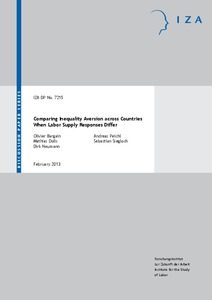Comparing inequality aversion across countries when labor supply responses differ
"We analyze to which extent social inequality aversion differs across nations when control- ling for actual country differences in labor supply responses. Towards this aim, we estimate labor supply elasticities at both extensive and intensive margins for 17 EU countries and the US. Using the sa...
| Main Authors: | , , , , |
|---|---|
| Institution: | ETUI-European Trade Union Institute |
| Format: | TEXT |
| Language: | English |
| Published: |
Bonn
2013
IZA |
| Subjects: | |
| Online Access: | https://www.labourline.org/KENTIKA-19128859124919460319-Comparing-inequality-aversion-.htm |
| _version_ | 1771659893641576448 |
|---|---|
| author | Bargain, Olivier Dolls, Mathias Neumann, Dirk Peichl, Andreas Siegloch, Sebastian |
| author_facet | Bargain, Olivier Dolls, Mathias Neumann, Dirk Peichl, Andreas Siegloch, Sebastian |
| collection | Library items |
| description | "We analyze to which extent social inequality aversion differs across nations when control- ling for actual country differences in labor supply responses. Towards this aim, we estimate labor supply elasticities at both extensive and intensive margins for 17 EU countries and the US. Using the same data, inequality aversion is measured as the degree of redistribution implicit in current tax-benefit systems, when these systems are deemed optimal. We find relatively small differences in labor supply elasticities across countries. However, this changes the cross-country ranking in inequality aversion compared to scenarios following the standard approach of using uniform elasticities. Differences n redistributive views are significant between three groups of nations. Labor supply responses are systematically larger at the extensive margin and often larger for the lowest earnings groups, exacerbating the implicit Rawlsian views for countries with traditional social assistance programs. Given the possibility that labor supply responsiveness was underestimated at the time these programs were implemented, we show that such wrong perceptions would lead to less pronounced and much more similar levels of inequality aversion." |
| format | TEXT |
| geographic | OECD countries |
| id | 19128859124919460319_d099ec37f577408583eb95a702283be7 |
| institution | ETUI-European Trade Union Institute |
| is_hierarchy_id | 19128859124919460319_d099ec37f577408583eb95a702283be7 |
| is_hierarchy_title | Comparing inequality aversion across countries when labor supply responses differ |
| language | English |
| physical | 1 v. Digital |
| publishDate | 2013 |
| publisher | Bonn IZA |
| spellingShingle | Bargain, Olivier Dolls, Mathias Neumann, Dirk Peichl, Andreas Siegloch, Sebastian income tax labour supply social assistance statistics social inequality Comparing inequality aversion across countries when labor supply responses differ |
| thumbnail | https://www.labourline.org/Image_prev.jpg?Archive=111013593929 |
| title | Comparing inequality aversion across countries when labor supply responses differ |
| topic | income tax labour supply social assistance statistics social inequality |
| url | https://www.labourline.org/KENTIKA-19128859124919460319-Comparing-inequality-aversion-.htm |

